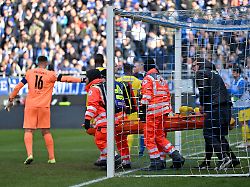Great dangers in football
Bundesliga defines new way of dealing with head injuries
3/30/2023, 6:13 p.m
Head injuries are an ongoing issue in professional football, and how to deal with them is not clearly regulated – until now. The 36 clubs in the 1st and 2nd Bundesliga decide on a binding protocol. This regulates the steps to be taken between injury and returning to the football pitch.
For the first time, the 36 clubs in the Bundesliga and the 2nd division have agreed on a uniform approach to head injuries. A corresponding protocol was signed by the head coaches, sports managers and team doctors. “Head injuries are not trivial,” emphasized long-time DFB team doctor Tim Meyer, who was in charge of creating the guidelines with Claus Reinsberger, and added: “Everyone involved cannot be made aware of this often enough.”
Ansgar Schwenken, Director of Match Operations & Fans of the German Football League (DFL), said: “Since head injuries unfortunately cannot be ruled out in a dynamic sport like football, dealing with them responsibly is all the more important.” The protocol is “another step in terms of the health of the players”.
It contains measures and guidelines for the treatment of acute head injuries during training or matches. Neurological examinations at the beginning of the season are intended to determine the “normal state” of the players, on the basis of which decisions can be made when it comes to diagnosis and the resumption of sporting activities, as well as about the return to play after an injury.
Verification system and better education
There will also be a medical review system to support the prompt and informed assessment of head injuries. Players and support staff are also better trained and sensitized to the topic. “The measures to educate, prevent and treat head injuries have been significantly expanded in recent years. That is to be welcomed,” said Meyer.
The “DFL Head Injuries Protocol” was developed by the DFL’s “Medicine in Professional Football” working group headed by Meyer with the support of the Medical Commission of the German Football Association. Meyer is also the medical director of the Institute for Sports and Preventive Medicine at Saarland University, Reinsberger heads the Sports Medicine Institute at Paderborn University.
